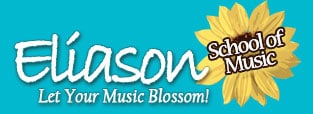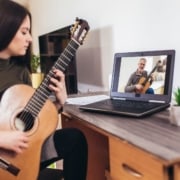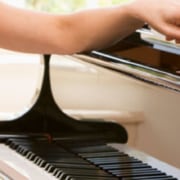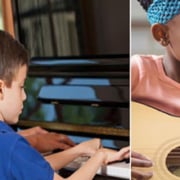“If music be the food of love, play on!” So wrote William Shakespeare in the play Twelfth Night. We aren’t 100% sure what he meant by that, but one thing is for sure: music is the food we love, and we want to play on! But learning music isn’t always easy, and finding the means of learning music is no walk in the park either. If you’re looking for a solution to this dilemma, you may consider the benefits of online music lessons. Read more
A Universal Understanding of Music And Piano Lessons
The opportunity to learn a musical instrument is one of the most wonderful gifts you can give your child. Piano is an especially fruitful instrument to learn due to the ways in which your child will not only grow their performance skills, but also their understanding of musicality in general. This is because learning the piano involves an understanding of music theory, with all of the intervals and chord changes visually represented on the instrument itself.
Though it can be said that other instruments also provide your child an understanding of music theory, piano is the most intuitive instrument for your child to learn if you want them to truly have a grasp on the subject. On top of this, the Eliason School of Music also uses the innovative Suzuki method as the backbone of our lesson schedules, allowing your child to learn an easy way to pick up pieces quickly while also maintaining a good sense of technique. We also understand that it’s most beneficial to learn from a variety of perspectives, causing us to also use the Faber and Faber method to teach piano efficiently.
Build Your Piano Skills From the Ground Up In Portland
Regardless of which type of music your child wants to play, it’s important to introduce them to piano playing in a way that focuses on technique at first. This is because the benefits of maintaining technical prowess such as posture and control will not only make playing music easier, but also help your child play without risk of injury later on in their life. For many, this is one of the main reasons to study at the Eliason School of Music, as we are known for our technically focused lessons that help your child have the tools necessary to be both a versatile musician and a healthy one.
This is why our lessons initially center around classical music. As a tried-and-true method for teaching one piano, the classical repertoire has a wide variety of different exercises and pieces that you child can play. Not only is there already a rich history of repertoire composed specifically for beginners, but your child can also use these pieces to learn a lot about how to play piano and begin developing their overall skills early on.
Another benefit of learning from the classical repertoire is that there are plenty of opportunities for your child to perform pieces written for beginners, allowing them to not only develop their technical skills, but also their performance abilities. These are all important building blocks to being a successful artist, meaning that your child will undoubtedly get an education that suits them.
Flexibility is Possible With Piano Lessons
One of the unique things about our piano lessons is that we begin by teaching primarily classical music, but allow your child to open up to jazz and other types of pop music if they want to later on in their lessons. This is part of our initiative to consistently keep piano lessons engaging and fun, allowing children to feel completely comfortable in piano lessons and never bored. Through this teaching method, you’ll likely never have to convince your child to practice, as they will be clamoring to get straight to their lessons!
In the modern day and age, we find that the most important way to get a child to stay on top of piano technique is to meet them where they’re at, resulting in our lessons catering to what your child needs but also what they want. This is why so many parents keep coming back to the Eliason School of Music in Portland Oregon, as we understand what it means to give your child quality, well-rounded music education!
Portland Oregon Piano Brings Life Lessons
One of the most important things about learning piano is that the life lessons your children will learn extend far beyond just musical knowledge. For example, being able to practice an instrument in preparation for weekly lessons can teach your child a great deal about time management, forcing them to adapt to some sort of regular routine. This might seem like a small factor in one’s daily schedule, but can actually go a long way to teaching your child how to organize their time and stay on top of assigned tasks.
Another important life lesson that can be learned from piano lessons in Portland OR is the ability to practice mindfulness. In order to learn the instrument efficiently, children in our lessons have to understand how to properly concentrate and build their memory skills. On top of this, having to focus on performance and concentration under potentially nervous situations allows your child the opportunity to build their perception of mindfulness.
Mindfulness is an important skill to learn and can help growing children in many other areas of their life. For example, the skills your child learns from staying calm before a piano performance can easily be applied to test-taking situations in school and potential auditions later on in life.
Piano Lessons Offer Health Benefits!
Did you know that there are also many health benefits of playing piano? Learning music is a way for your child to not only increase their musical understanding of the world, but also their mathematical one. Those who practice music from a young age are shown to have stronger understandings of mathematics, reading comprehension, and even less stress overall!
To find out more, visit our Portland OR Piano Lessons page here or you can reach us below:
Eliason School Of Music | Piano Lessons Portland
2929 SW Multnomah Blvd STE 101
Portland, OR 97219
(503) 293-2390
Eliason Music was voted in the top 3 for piano lessons Portland Oregon. They also offer guitar lessons, violin lessons, and cello lessons.
In our Music School in SW Portland we see hundreds of students sign up for lessons every year, eager to embark on the exciting journey of learning music. There is always a honeymoon period when you begin an instrument, where everything is exciting and new. This period may last weeks or months but after this initial phase motivation and inspiration can begin to lesson. In our Portland Oregon piano lessons program we meet frequently as teachers to increase our ability to motivate and inspire our students so they can sustain a long term and lasting musical experience. Here are some tips that will surely come in handy for yourself or for a son or daughter.
#1) Plan your practice week in advance. This is one of the main reasons that people do not practice, lack of planning. A student might feel good about lessons as well as their instrument, but perhaps they have not found a consistent way to fit lessons in during the week. Take a moment to mark down 4 to 6 days and times of the week where you know you can practice. Write this down as a weekly practice plan and place it where you will see it everyday, such as on a mirror, door or refrigerator. Just recently the head of our piano lessons in Portland Oregon program mentioned that this had increased practice in nearly all of her students and it is her #1 technique.
#2) Assess the level of Motivation. Ask the question “how do I feel about playing music these days?” and rate the answer on a scale of one to ten with ten being the highest. Any score below a 6 means that you need to change your practice plan to increase the motivation. One of the best ways to do this is to change the piece. As an instructor you can play 5 to 10 excerpts of pieces for a student that are within their ability and have them rate them on a scale of 1 to 10 for how much they like the piece. Take the piece or pieces with the highest ranking and begin working on these. One teacher at our Portland Oregon guitar lessons location, keeps a notebook with ten of the most popular pieces with him. This is very convenient because you can begin to work on the new piece right away and students are often excited to get home and start practicing!
#3) Understanding what to do when frustration sets in. If you have planned your practice and you are motivated then you begin to spend more time with your instrument. However, you might find yourself frustrated if the piece or exercise you are working on is not going well. There are several things you can do to overcome this roadblock. Firstly, slow down and allow yourself to be able to consciously understand what you are doing. It is very likely that you are playing too fast for the skill at hand (subconscious speed) and you need more very slow conscious training of the music to learn the skill. Stopping frequently and just thinking about the music is another way to slow down and learn it from a conscious place. Secondly, try playing it many different ways to break out of the roadblock. Try it too fast and then too slow. Play it too loud and then too soft. Play it with your body tense and then with your body soft. After doing these experiences you will be wiser to the music. Now, imagine how it sounds ideally and play it naturally and with ease. The third way to overcome frustration is to simply walk away. Sometimes our mind needs space for the learning to soak in. Stop playing it and listen to it on a recording or listen to play of an inspiring artist. Try it later in the day or after a good night’s sleep. It will often be there for you when you have the wisdom to know the music needs a break and a chance to “breathe.”
#4) Commit to a long-term experience with your music. In our Portland Piano Lessons Portland school we recommend that students commit to at least two years of learning before they entertain any thoughts of quitting. At that point you will want to commit to another two years. The truth is that learning an instrument will not move in a steady line and it will rise and fall over time. Usually the changes are small, however sometimes they can be larger. A large drop in motivation will cause a non committed student to quit, however if you have committed to at least two years you will stick it out and hang in there. If you do this you will come out in the end with not only greater skill but a feeling of confidence and self esteem that you can stick with things and accomplish very much.
It is our hope that these ideas are helpful to you as you journey along your musical path. Music is a lot of fun and if you use these ideas you will overcome many roadblocks, leading you to a more rewarding and fulfilling experience.
The Parent’s Guide to Beginning Music Lessons: This guide is designed to help parents who are thinking about starting their children in music lessons. As a music teacher for twenty years, I have answered the most common questions I am typically asked about beginning children in music!

~ ~~~~~~Question: “My child is almost four years old. Is this too young to begin lessons?” Answer: This varies greatly depending on the child as well as the expectations for the lessons. A typical beginning music lesson is thirty minutes in length and therefore requires an attention span that can last for the duration of this time. Some children near the age of four will have no difficulty focusing for an entire lesson while others cannot yet hold their attention and they are not ready. If you feel that your child is very focused for their age, then perhaps a single beginning music lesson can be arranged to see if it is they are ready. It should also be mentioned that no matter how talented a child may be progress is typically slower at this age. The risks of beginning lessons too early are the learning of bad habits with the instrument as well as becoming frustrated and turned off to music. If, however, beginning music lessons are structured in a fun and exciting way and proper technique is being reinforced then the lessons are a success and it works wonderfully. Question: “What is the best instrument to begin learning music with?” Answer: Music educators will sometimes disagree with each other on the answer to this but typically the piano is the best choice followed by the violin. The way the piano is organized makes it easier for students to understand how music is structured and the learning curve is easier on the piano compared to many other instruments. Sometimes, however, children seem particularly drawn to the sound of a certain instrument and they should follow this inner guidance. For example, my parents first introduced me to the keyboard but I did not really enjoy it and had no interest in practicing. My parents probably figured I wasn’t destined to be a musician and I began focusing on other things. A year later I took a violin class at school and I loved the instrument which has become my passion ever since. If children are fascinated by a particular type of instrument and ask specifically for it then we should listen to this and choose the instrument they are longing to play. It should be mentioned that the piano and violin work well for students at the age of four but other instruments such as the flute or the guitar have physical demands that require waiting until about the age of six for beginning music lessons. Question: “What is the best method to use when learning an instrument?” Answer: This question can be answered by looking at the roadblocks that students can run into along their musical journey. The first example is when a student learns to decipher music purely by ear without any attention to note reading or music theory. If a student is kept in this method for too long they eventually reach a plateau where the music has become so complicated that they can no longer understand how to play these newer pieces. At this point students either quit due to the frustration or they begin a long and difficult path of heavy note reading and theory in an attempt to catch up to the demands of the music. Young children typically do not enjoy note reading assignments and if they are too long they become bored and frustrated. It is much easier to assign very short note reading assignments over a long period of time so this skill is developed easily and without struggle. The second example of a roadblock that students can run into is the complete opposite of the first. This is when the lessons begin with a heavy emphasis on note reading and theory while playing the instrument is extremely limited. I have heard stories of students who have attended beginning music lessons for two years, but they still have not learned a song. This is much like going to swimming lessons for years and talking all about swimming techniques without ever going into the water. It is important to dive in when learning an instrument and play songs early on so you can connect with and learn to love the instrument. If a program is designed in such a way that it allows students to both learn to play by ear and learn note reading and theory in small amounts along the way this approach will provide the best of both worlds. Children will be able to enjoy playing their instruments every day and they will begin to understand how music is structured through the note reading process. This combination approach keeps students motivated by playing lots of songs and it avoids the risk of not being able to understand the more complicated pieces they will learn in the future. Question: “How do I go about finding the right music teacher?” Answer: “Most parents want to see their children practicing consistently and if this is not happening then they are not happy. This is because parents want to see their children develop and grow. Parents also want to see their children happy and enjoying music all around. A skilled teacher will be able to understand this process and they will be able to deliver a healthy balance of fun and growth during beginning music lessons. I have noticed over the years that if students are not growing at all musically, they might be having fun, but it will not last. Other students who are growing all the time through very difficult pieces can become burnt out and lose the love of playing. Only when lessons balance fun and growth will the lessons be a success. This idea is a simple one but designing beginning music lessons in this fashion can be very challenging. Finding an experienced teacher with a music degree who is devoted to being a career teacher is preferable to a teacher who teaches as a hobby occasionally from their home. Music schools are the best place to find beginning music lessons and highly skilled teachers who are dedicated to their students and to music. Question: “How much practice should be required for learning the instrument?” Answer: “This varies depending on what your goals are in learning to play an instrument. Most parents are not pushing their children into music as a profession but they want to see them learn the skill and be able to play well. A quality, thirty minutes of practice four or five days a week can produce excellent results over time. Students who continue with this amount of practice will eventually be able to play extremely advanced works such as concerto’s and they have a beautiful sound when doing so. Music is a wonderful skill that children can have for life and will enrich their lives in so many ways. Question: “How long will it take for my child to become good at their instrument?” Answer: “This depends of course on how much time is devoted to practicing their beginning music lessons. Typically if a student is practicing thirty minutes a day, four to five days a week they should be able to play a Christmas Carol in about four to five months of practice and sound good while performing. To be able to perform more complex works such as Gavotte’s and Minuets will take about one and a half to two years and concerto performing will take about five years of study. Small, consistent practice over years can produce truly amazing results! ~ ~~~~~~Brian Eliason is a music educator who has taught over 15,000 music lessons and he is the founder of the Eliason School of Music in SW Portland. If you have questions, you can contact Brian through the website:www.EliasonMusic.com or by calling (503)293-2390.
Contact
Map
Location
2929 SW Multnomah Blvd.
STE 101
Portland, OR 97219











